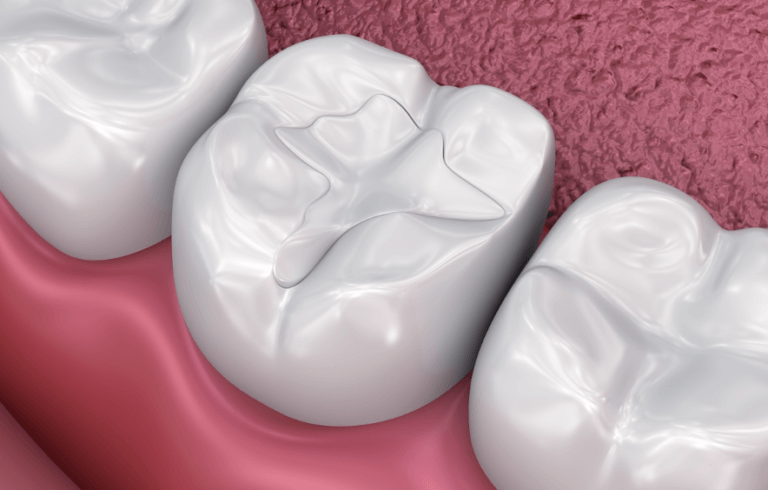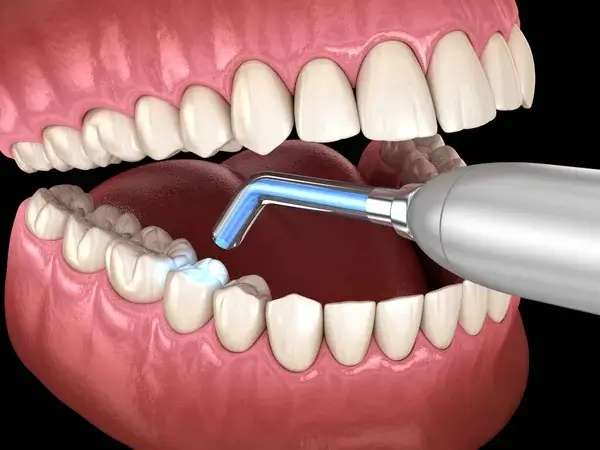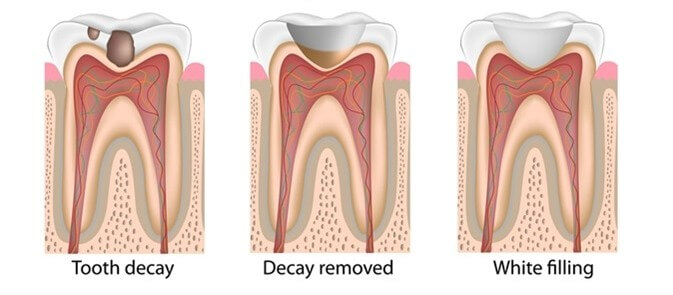Glass Ionomer Filling

What Is A Glass Ionomer Filling?
A Glass Ionomer Filling is a type of dental restorative material used for treating cavities and minor defects in teeth. It is composed of a mix of glass particles and organic acid, which hardens upon setting in the tooth. This filling is well-regarded for its biocompatibility and its ability to release fluoride, which helps prevent future decay. Here’s everything you need to know about glass ionomer fillings, including their benefits, alternatives, and whether they’re the right choice for your dental health:
- Who Should Consider a Glass Ionomer Filling?
- Benefits of Glass Ionomer Fillings
- Alternative Treatments to Glass Ionomer Fillings
- How Much Does A Glass Ionomer Filling Cost?
- Steps in the Glass Ionomer Filling Procedure
- Frequently Asked Questions About Glass Ionomer Fillings
If you have any further questions about A Glass Ionomer Filling or other dental services offered at Atlas Dental, please contact us.

Free phone consultation
Have questions about tooth fillings? Schedule a free phone consultation with our Toronto dentist.

5 star google reviews
Our patients love us! See for yourself why more and more people are choosing Atlas Dental for their dental fillings.

Book Emergency tooth filling
Do you think you have cavities and need an appointment? Book an emergency tooth filling online.
Who Should Consider a Glass Ionomer Filling?
Glass ionomer fillings offer a versatile solution for various dental needs and patient demographics. These fillings are especially suitable for:
- Children and Adolescents: Their fluoride release helps prevent cavities in young patients and is ideal for primary (baby) teeth.
- Patients with Dry Mouth: Those with xerostomia benefit from its fluoride-releasing properties, providing added protection.
- Small to Medium Cavities: These fillings work well in non-load-bearing areas and chemically bond to the tooth structure.
- Root Surface Decay: Often seen in older adults with gum recession, glass ionomer fillings can restore exposed roots effectively.
- Cervical Lesions (Abfraction): These wedge-shaped defects at the gumline are well-suited for this type of filling.
- Patients at High Risk of Cavities: Individuals with frequent decay may benefit from the added layer of protection.
In cases of large or load-bearing cavities, your dentist may recommend alternative materials like composite resins or amalgam. The decision on which type of filling to use will depend on the individual patient’s needs, the location and size of the cavity, as well as the dentist’s professional judgment. If you have further questions about Glass Ionomer Fillings, please contact us.
Advantages of Glass Ionomer Fillings
Here are the key benefits of choosing a glass ionomer filling:
- Fluoride Release: Provides ongoing protection against cavities by strengthening tooth enamel.
- Holistic and Biocompatible: Glass Ionomer fillings offer a mercury-free, biologically-safe dental solution that promotes overall oral health and eliminates risk of heavy metal allergies or sensitivities.
- Chemical Bonding: Forms a strong bond with the tooth, minimizing leakage and risk of decay.
- Versatility: Ideal for various locations in the mouth, particularly non-load-bearing areas.
- Aesthetic Appeal: Blends well with natural tooth color, ideal for visible areas.
- Minimal Tooth Preparation: Requires less removal of healthy tooth structure.
- Desensitization: Reduces sensitivity, offering comfort for patients with sensitive teeth.
- Suitability for Primary Teeth: Great for children’s teeth due to ease of application and fluoride release.
A consultation with a knowledgeable dentist can help determine whether a glass ionomer filling is the ideal choice for restoring your dental health and preserving your beautiful smile. If you have further questions about Glass Ionomer Fillings, please contact us.

Alternative Treatments to Glass Ionomer Fillings
In some cases, other materials may be more appropriate. Alternatives include:
- Composite Resin Fillings: Offers excellent aesthetics and bonding but may be less durable in some cases.
- Amalgam Fillings: Known for strength and durability, best for larger fillings in back teeth.
- Porcelain Inlays and Onlays: Custom-made for larger cavities, providing excellent strength and color-matching.
- Dental Crowns: Necessary for extensive damage, covering the entire visible portion of the tooth.
- Dental Veneers: Ideal for cosmetic improvements, covering the tooth’s front surface.
The choice of the most appropriate restoration will depend on factors such as the size and location of the cavity, the tooth’s condition, and the patient’s aesthetic preferences. If you have further questions about Glass Ionomer Fillings, please contact us.
Cost of Glass Ionomer Fillings
Routine Dental Fillings cost $207-477 depending on the location of the tooth (anterior, bicuspid or molar), as well as the number of “surfaces” involved. Imagine each tooth as a 5 surface box. Each “surface” of this imaginary box will dictate the size (and cost) of the tooth filling. The codes relevant to regular dental fillings in the Ontario Dental Association’s Suggested Fee Guide appear as follows:
Permanent Anteriors:
- 23111 – One surface: $205
- 23112 – Two surfaces: $256
- 23113 – Three surfaces: $308
- 23114 – Four surfaces: $379
- 23115 – Five surfaces (maximum surfaces per tooth): $400
Permanent Bicuspids:
- 23311 – One surface: $226
- 23312 – Two surfaces: $283
- 23313 – Three surfaces: $339
- 23314 – Four surfaces: $414
- 23315 – Five surfaces or maximum surfaces per tooth: $435
Permanent Molars:
- 23321 – One surface: $246
- 23322 – Two surfaces: $308
- 23323 – Three surfaces: $369
- 23324 – Four surfaces: $451
- 23325 – Five surfaces or maximum surfaces per tooth: $477
Regular Dental Fillings are considered a basic service under all dental insurance plans and should be covered to your maximum insurable limit, but be sure to find out from your dental insurance plan provider how much you are eligible for before going ahead with dental treatment. Our fees are consistent with the ODA Fee Guide.
For patients without dental insurance, Atlas Dental is pleased to offer dental financing through iFinance Dentalcard. Affordable payment plans start at 7.95% for terms of 6 months to 6 years. To learn more about Dentalcard dental treatment financing, follow this link.
Steps in the Glass Ionomer Filling Procedure
Here’s what to expect during your glass ionomer filling treatment:
- Examination and Assessment: A thorough check-up and X-rays are performed to determine the need for a filling.
- Tooth Preparation: Decayed areas are removed, and local anesthesia is administered if necessary.
- Isolation: A dental dam or cotton roll keeps the tooth dry.
- Conditioning: A conditioner is applied to create a strong bond.
- Placement: The glass ionomer material is applied, shaped, and packed into the cavity.
- Setting: The filling hardens through chemical curing, bonding to the tooth.
- Polishing and Bite Adjustment: Final adjustments ensure a comfortable fit.
Glass ionomer fillings are generally well-tolerated, and patients can resume normal eating and drinking shortly after the procedure. However, it is essential to follow the dentist’s recommendations for optimal healing and long-term success of the filling. If you have further questions about Glass Ionomer Fillings, please contact us.

Frequently Asked Questions About Glass Ionomer Fillings
- How long do glass ionomer fillings last?
Glass ionomer fillings typically last 5–7 years but may wear out sooner in areas with heavy chewing forces.
- Can glass ionomer fillings be used for root cavities?
Yes, they are particularly effective for root cavities as they bond well to the tooth and release fluoride, which helps protect exposed root surfaces.
- Are glass ionomer fillings safe for people with metal allergies?
Yes, glass ionomer fillings are free of metals and are a great option for individuals with metal sensitivities.
- Are glass ionomer fillings covered by insurance?
Coverage varies by provider, but many dental insurance plans include them as a standard restorative option. Check with your insurer for details.
Glass ionomer fillings are a versatile and beneficial option for restoring cavities, especially in areas where fluoride release is advantageous. If you have further questions about Glass Ionomer Fillings, please contact us.

